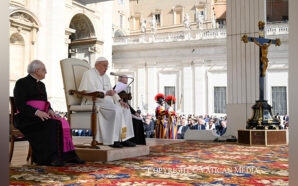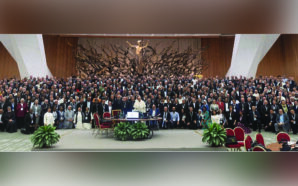An inductive approach to religious education, starting for the actual lived experience of the students is the only effective method by which we can engage with people of any age
Times past
Controversy over catechetical and religious education programs has raged for as long as I can remember. Having been born in the mid-1950s my primary years of schooling were dominated by learning the “Penny Catechism”.
Each day after registration we would spend some time learning answers to questions put in the catechism, with the aim of repeating the answer, parrot-fashion, the following day… and whenever the headteacher or the religious inspector might darken the doors of the classroom. An added feature came on a Monday morning when the first thing we did was to fill in our own Mass Register.
The Mass Register recorded whether or not we had attended Mass the day before, along with boxes to be ticked if we had been to the “Children’s Mass” at 9:15, received Holy Communion, been to Confession, and had attended “Sunday School and Benediction” in the afternoon.
Given that I came from a family that was ‘addicted’ to going to church, my score was almost always perfect, whereas any child whose parents rarely attended church had great blank spaces in their register.
The “Mass Register” died out in the early 1960s, thank God, and gradually newer forms of religious education began to appear. These were often held in great suspicion, especially by parish priests and other senior clergy.
Times present
Recently I came across an interesting comment in The Spirit of Catholicism (Bloomsbury, London, 2021), a book by the Dominican theologian Vivian Boland.
In a chapter dedicated to learning about faith matters he writes the following:
In a recent analysis of the collapse of Irish Catholicism, one of the reasons given for that collapse is the infantilizing textbooks through which the generation that is now adult were taught the faith when they were children. Children themselves do not want to be infantilized, never mind adults.
Perhaps some catechetical programs were so effectively adapted for younger children that their content and purpose seemed only to belong to the same stage of development as Thomas the Tank-Engine and Postman Pat – to be appreciated when we are children but left behind when we move on to serious study and face the demands of adult living. (p. 151)
Boland does not cite which study he is referring to, and he is certainly not impugning the intentions of the authors of any of those programs, but the criticism is a fairly damning one, nonetheless.
Boland demurs at the suggestion that in his book he is trying to emulate the classic work of Karl Adam of the same title (first published in 1924), and in his Introduction he refers also to works by De Lubac, Newman, and von Hugel, of a similar vein. Having admired these earlier works he continues:
I believe… that the social and cultural situation of our time, as well as the challenges the Church is facing, require that the same distinctive characteristics and teaching of Catholicism should be highlighted. (p. 17)
Whatever the modesty of his claims the book is nonetheless a very worthy modern take on the issues raised in earlier times by those authors and is a welcome new take on ecclesiology for our times, even if I do not always agree with some of his comments and conclusions.
I should point out that I am neither a catechist nor a religious education teacher, but I was involved for a number of years in training catechists and RE teachers; as well as checking over, from a theological perspective, programs that were then introduced in my own diocese and across England and Wales.
(I have no knowledge of similar programs introduced into Ireland during this time.) I suspect that there are a number of people critical of those programs for the same reasons that Boland offers in regard to Ireland.
Is it a fair criticism?
Failures of the past
Recalling my own religious education and sacramental preparation in the early 1960s the methodology used was almost entirely deductive: learning catechism answers by rote in much the same way that we learned our times-tables.
The questions were neither ours in our own language, nor were the answers, which often used rather unfamiliar and fairly inaccessible terminology.
The standard response to an awkward question, if one dared voice it in class, was, “It’s a mystery.” In those days this was meant as a put down simply telling the pupil to shut up and accept what was being said on faith.
It was a very unsatisfactory way of teaching and learning that did not so much “infantilize” us – except from the point of not inviting any questions of our own – but it did bore the pants off us and resulted in people, as they grew up, ditching something that seemed utterly irrelevant to life.
I can honestly say – while not in any way denigrating the good intentions of my religious education teachers – that, with one or two exceptions, we were effectively meant to leave our inquiring minds at the classroom door for RE lessons.
This was in complete contrast to other subjects we were taught.
For sure, one or two attempts were made later in my secondary school teaching (by now we are at the beginning of the 1970s) to engage with questions we did have, and there was always a strong encouragement to engage in apostolic activities – working with special needs children and adults or at a soup kitchen.
For many of my contemporaries, however, the change came far too late. They were lost forever to the Catholic Church, though not necessarily to other iterations of Christianity.
My own theological awakening was thanks to a very enlightened parish priest who came to my home parish in 1970, and thanks to my studies in the seminary and at university. It was here that a fascination with scripture, theology and Church history were truly born.
Thanks for this is due to those who taught me at Ushaw College, and the universities of Durham and Louvain (K.U. Leuven). Taught by men and women (though mainly men at that time) of deep faith and commitment, my life-long engagement with the “things of God” was nurtured.
It is because of my own experience that I am leery of taking Boland’s criticisms as a reason to return to deductive methods of teaching and catechetics which is a cry heard frequently these days.
So where do we go from here?
Evangelization and learning from the past
Pope Francis has served notice that the entire Church is on a missionary footing.
Throughout his many apostolic documents and his homilies, he has talked extensively about the need for people to be “missionary disciples”. He has even reorganized the entire Roman Curia to serve notice that mission/evangelization is a priority.
There can be no doubt that in these islands, and across the developed world, we are indeed missionary territory. Amongst other things our catechetical and religious education programs need to reflect this situation.
I feel sure that many of them already do so in many respects, but we need to be absolutely certain of this.
One way to check on the missionary nature of our work is to return to some basic ideas set out by Second Vatican Council’s Decree on the Missionary Activity of the Church (Ad gentes, AG).
In the opening chapter, setting out principles for mission, the Fathers at the Council make clear that we can never pick and choose which bits of the Gospel we pass on, rather it is the whole gospel message that needs to be shared:
The mission of the Church is carried out by means of that activity through which, in obedience to Christ’s commands and moved by the grace and love of the Holy Spirit, the Church makes itself fully present to all men and peoples in order to lead them to faith, freedom and peace of Christ by the example of its life and teaching, by the sacraments and other means of grace. Its aim is to open for all people a free and sure path to full participation in mystery of Christ. (AG, §5)
At the same time the Fathers were also aware that the context in which the Gospel was preached varies: a factor which needs to be taken into account in any effective missionary activity:
The task (of preaching the Gospel)… is the same everywhere and in all situations, although because of circumstances, it may not always be exercised in the same way. The differences which must be recognized in this activity of the Church, do not flow from the inner nature of the mission itself, but from the circumstances in which it is exercised. (AG, §6)
Bearing this in mind we have to try to engage in this complex endeavor.
For help and inspiration, a good starting-point are the examples of evangelization that we find in the Acts of the Apostles.
Here we notice that when Peter is addressing the crowd in Jerusalem or the Sanhedrin, or when Paul is addressing the congregation in the synagogues at Philippi and Antioch of Pisidia, they both draw extensively on the Hebrew Scriptures as they present the gospel message to their Jewish audience, who were well-versed in the Law and the Prophets.
We notice different techniques used by Peter with the Roman Centurion Cornelius (Acts 10), and especially by Paul, when addressing the men of Athens in the Areopagus (Acts 17).
In this latter case, where the supposed sophisticates of Athens despised the Jewish religion, Paul makes no mention of the Hebrew Scriptures but argues from the experience and thinking of the audience in front of him.
He still preaches the message of Christ, of course. As soon as he mentions the idea of resurrection from the dead the crowd laugh at him, but he persists with the message and does gain some converts.
He begins with what they know and tries to lead them to the Gospel, in the same way, but taking a different tack than he does with a Jewish audience.
The message of the Gospel is always the same but the way in which it is initially presented takes into account the experience and thinking of any particular audience.
Discovering a Way Forward
In my own studies two books, in particular, helped formulate my thinking about how and what to teach in theology classes.
I first came across the writings of Jurgen Moltmann as an undergraduate. His book on the central Lutheran Doctrine of the Cross – The Crucified God (SCM Press, London, 1974) – poses the dilemma facing all Christian enterprises focused on mission and theology in this way:
The Christian life of theologians, churches and human beings is faced more than ever today with a double crisis: the crisis of relevance and the crisis of identity. These two crises are complementary.
The more theology and church try to become relevant to the problems of today, the more deeply they are drawn the crisis of their own Christian identity.
The more they attempt to assert their identity in traditional dogmas, rights, and moral notions, the more irrelevant and unbelievable they become. (p. 7)
For a Lutheran like Moltmann it is, of course, precisely in the unfolding theology of the cross that he works through a solution to his dilemma.
The dilemma, as outlined by Moltmann, made a great deal of sense to me when reflecting on my own experience (of strong, but irrelevant, identity) and hearing of some fairly whacky attempts at relevance in the early 1970s.
Thinking of just how to present theology to a class of seminary students once I began teaching was foremost in my mind when pursuing post-graduate studies. It was during this time that I came across the work of another Lutheran, the American sociologist of religion, Peter L. Berger, in a book published in 1980: The Heretical Imperative (Collins, London, 1980).
I had already come across some of Berger’s other work including A Rumor of Angels and Pyramids of Sacrifice, but it was this work focusing on theological method that captivated me.
To cut a very long story short – and hopefully in doing so not to over-simplify this wide-ranging book – for Berger an inductive approach is to theology is one that makes most sense today.
He homes in on the example of the Father of Liberal Protestant Theology, Friedrich Schleiermacher, as his paradigm for this approach.
Schleiermacher used human experience as the starting point of his theological method: specifically religious experience. From this he moved to reflecting on the various doctrines of the Christian Church (best exemplified in his seminal work of 1830, The Christian Faith).
Because human experience develops over time, and place, one of the consequences of this approach is to introduce the central necessity of an historical understanding to the theological endeavor.
Over the course of time liberal theology would degenerate into something that the “Father” would not have endorsed.
For the “Father” of its great counter-point, Neoorthodoxy, Karl Barth, the final nail in the coffin of this school of thought came when liberal theologians in Germany gave unreserved and unswerving support to the German War Machine in 1914, offering no criticism whatsoever of the warfare and the way it was being waged.
This act of complete surrender to the State, thus subordinating the revealed Word of God in the Scriptures, was the final straw for Barth and many others.
In short, the original inductive approach of Schleiermacher had been compromised in “reductionism”: reducing the Christian Faith to the needs of the contemporary state and so setting to one side the demands of the Gospel.
This is always a potential temptation for those espousing an inductive approach, and it must be carefully guarded against. The fundamental idea, however, remains. Berger expresses it thus:
Properly understood, faith and inductive reasoning stand in dialectic relation to each other: I believe – and then I reflect about the implications of this fact; I gather evidence about that which is the object of my faith – and this evidence provides further motive to go on believing (The Heretical Imperative, p. 141).
There is clearly much more to Berger’s work than I have outlined here but the idea of an inductive approach to theology was cemented in my mind and my approach to teaching. The caveat always remains, however, being very wary of reductionism.
It is the same inductive approach used by St Paul when speaking to the Athenians in the Areopagus.
He did not fail to move on to promote the hard core of the Gospel (and thereby descend into reductionism), once he had the attention of his audience, even at the expense of ridicule and rejection.
A few concluding thoughts
So, where does this leave us in regard to catechesis and religious education? I remain convinced that an inductive approach, starting for the actual lived experience of the students is the only effective method by which we can engage with people of any age.
It must, however, always move on from experience to the presentation of the Gospel (as St Paul did in Athens).These thoughts lead to two conclusion.
Firstly, we need to check that any programs used do, in fact, lead to proper knowledge of faith at an appropriate level for the age and stage of the students.
And, secondly, we need to make sure that those charged with the responsibility of delivering these programs are themselves well-versed both in the method and have a proper understanding of the content of what is being taught.
Both require resources, especially the latter since, as Bolan correctly observed in The Spirit of Catholicism (p. 151), we have many adults who do not know their own faith, never mind what to pass on to coming generations.
When working in religious education in the diocese, one of my colleagues from another diocese used to have a motto attached to all his correspondence to teachers and catechists: “An enthusiasm for the things of God”.
If we could inculcate such an attitude in sufficient people, we would be a long way along the road to making sure both that the Christian faith was being taught and, at the same time, reassured that those participating in the various programs are being offered material for adulthood, taking them beyond Thomas The Tank-Engine and Postman Pat.
Sean Hall is a presbyter in the Catholic Diocese of Hexham and Newcastle (England). Currently pastor of St Mary of the Rosary (Forest Hall), he previously taught theology at Ushaw College and has served as advisor for religious education in the diocese.
Reproduced with permission from La Croix International and Sean Hall.








